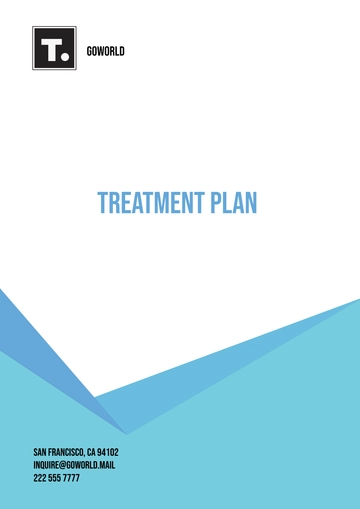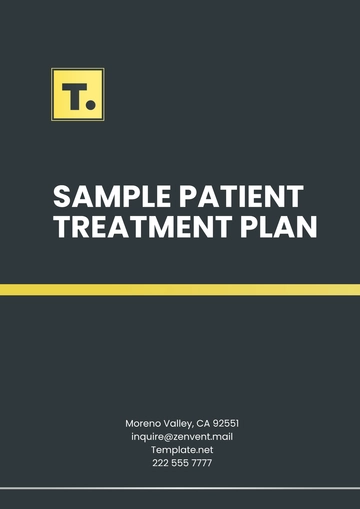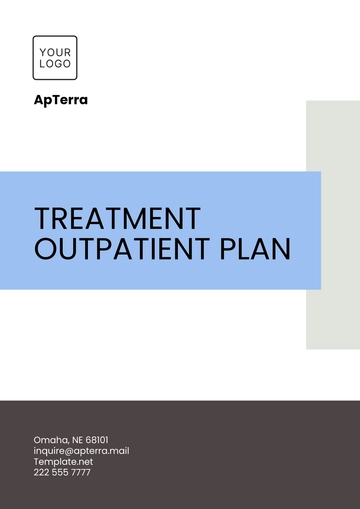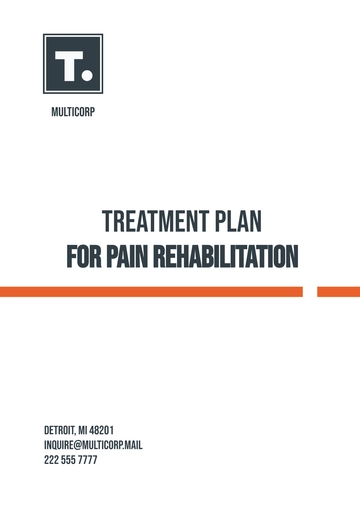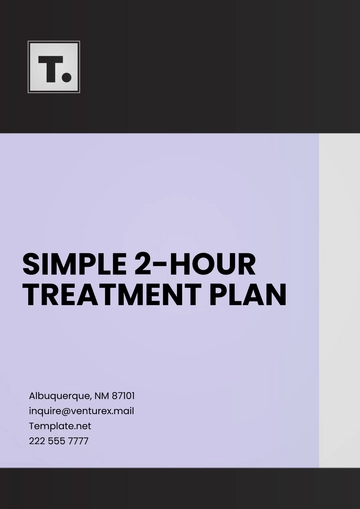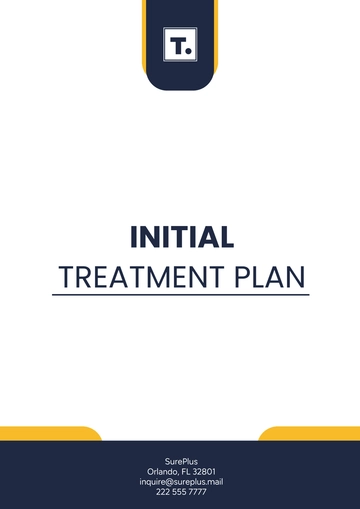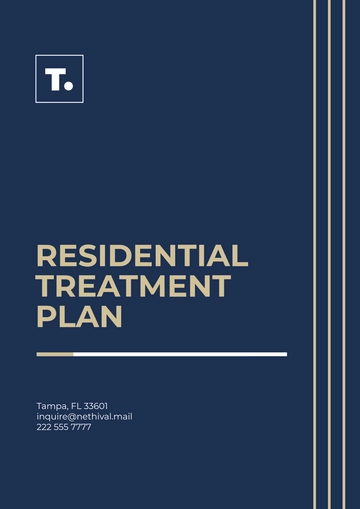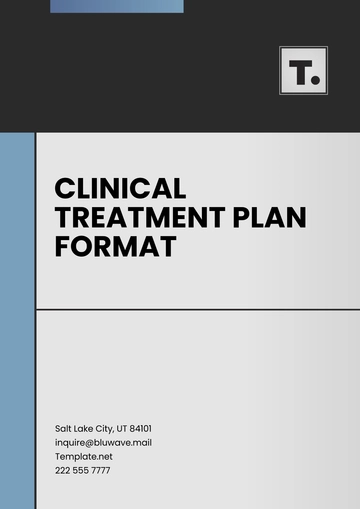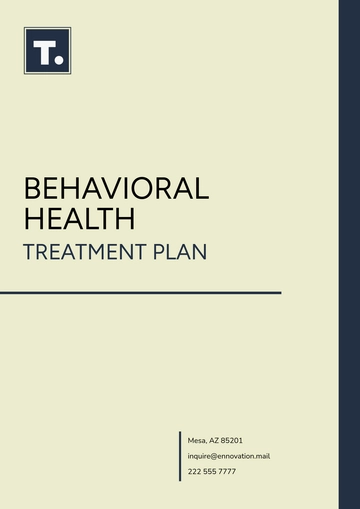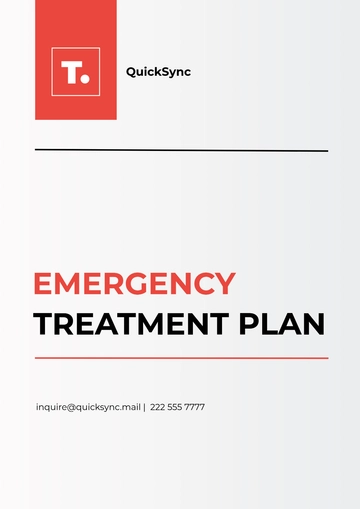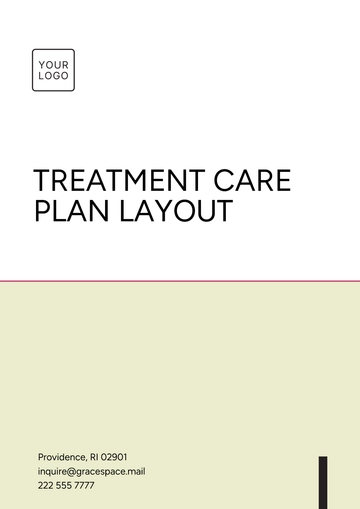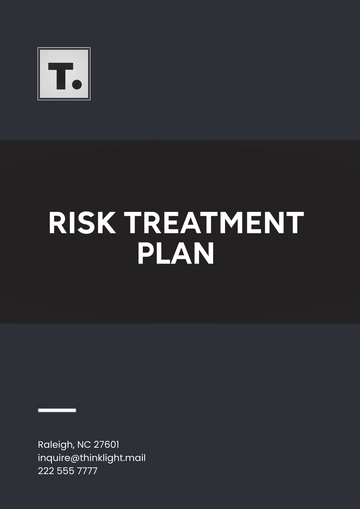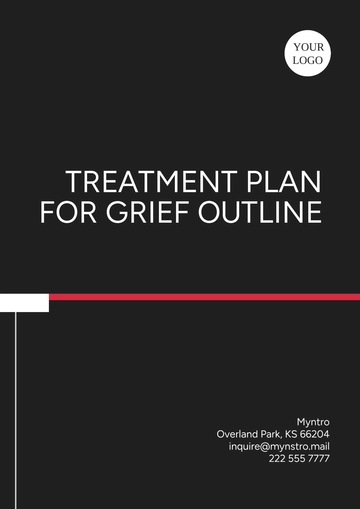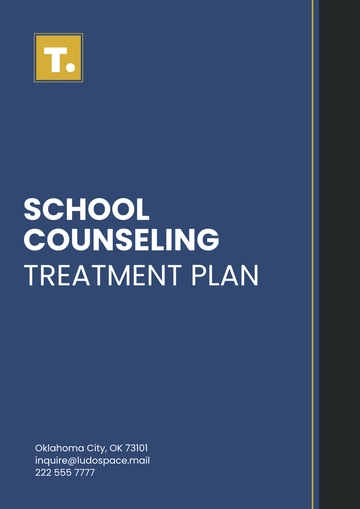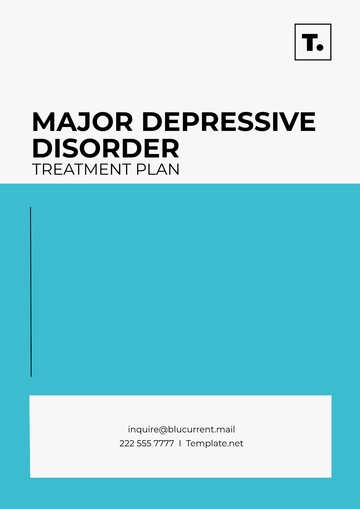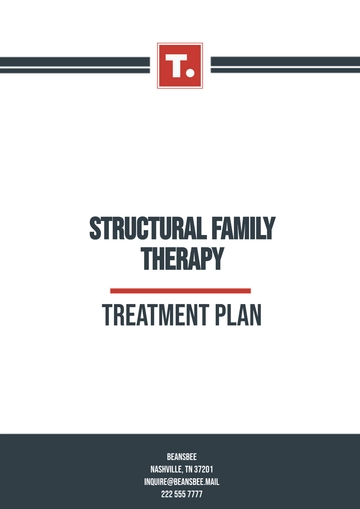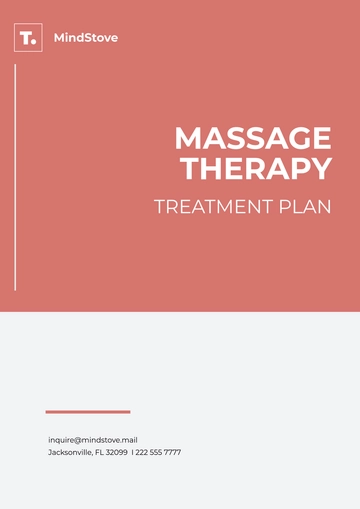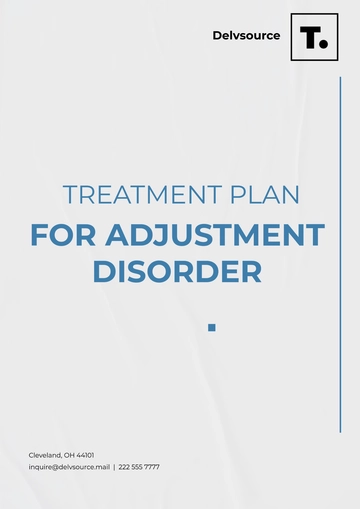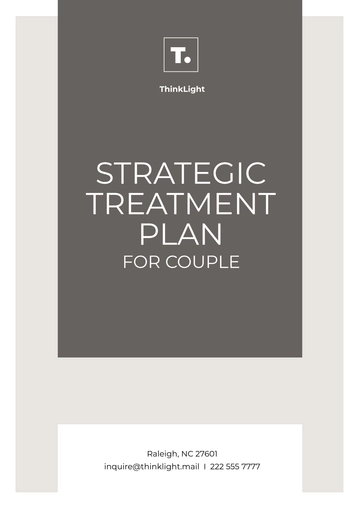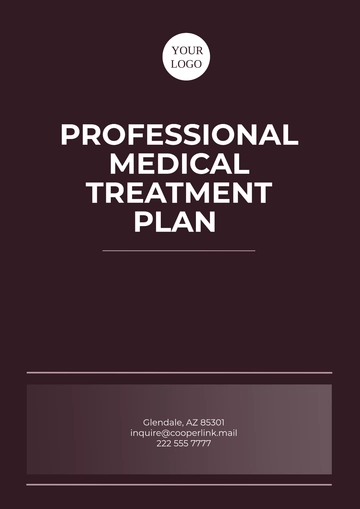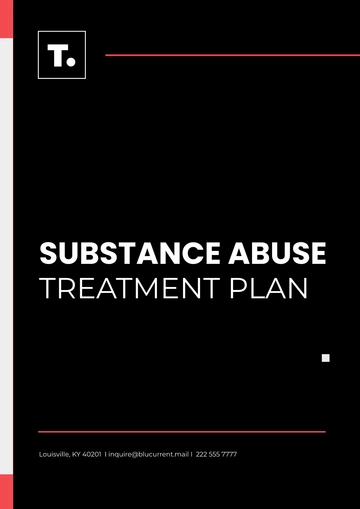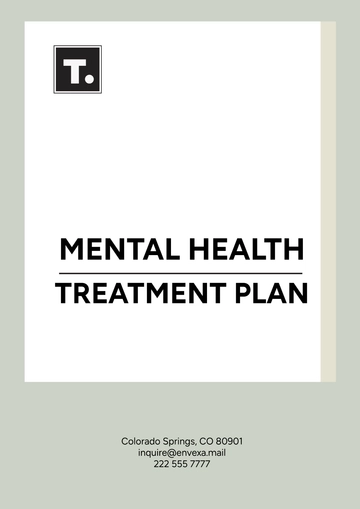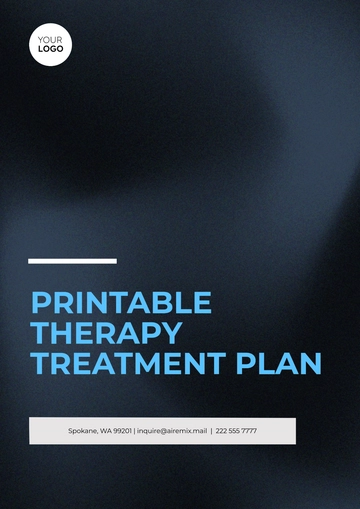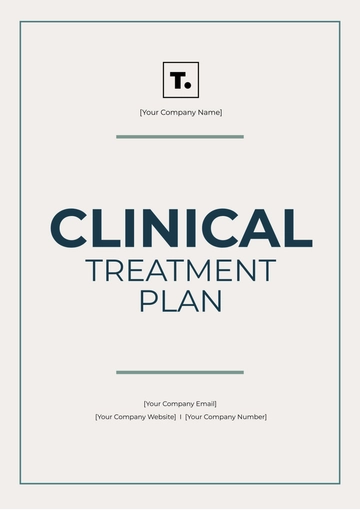Free Therapy Treatment Plan
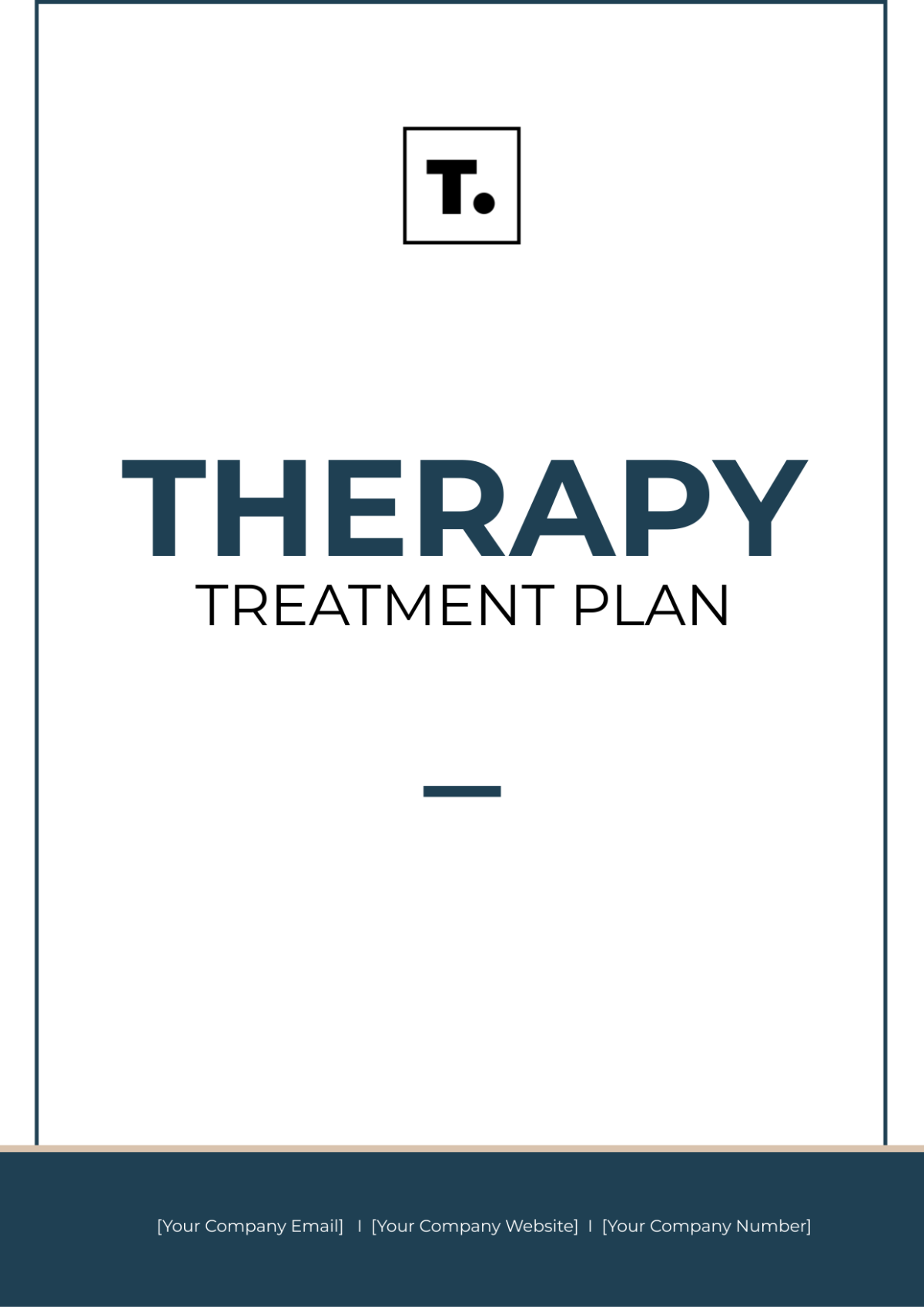
Prepared By: [Your Name]
I. Client Information
Client Name: | [Patient's Name] |
Age: | 32 |
Date of Birth: | 15 January 2050 |
Diagnosis: | Generalized Anxiety Disorder and Major Depressive Disorder |
Emergency Contact: | Jane Doe (222-555-7777) |
II. Presenting Problem
[Patient's Name] seeks therapy to address overwhelming feelings of anxiety and sadness that have been interfering with their daily functioning. They report experiencing constant worry about various aspects of their life, including work performance and relationships.
Additionally, they describe feeling irritable, fatigued, and disinterested in activities they once enjoyed. [Patient's Name]'s symptoms have intensified over the past six months, leading to difficulties in concentration and disruptions in sleep patterns.
III. Treatment Goals
Reduce Symptoms of Anxiety and Depression: Decrease the frequency and intensity of [Patient's Name]'s anxiety and depressive symptoms, including excessive worrying, low mood, and irritability.
Improve Interpersonal Relationships: Enhance [Patient's Name]'s communication skills to express their needs effectively and establish healthier boundaries in relationships.
Enhance Self-Esteem and Self-Confidence: Identify and challenge negative self-beliefs contributing to low self-esteem and cultivate a more positive self-image.
Develop Effective Stress Management Techniques: Learn relaxation techniques and stress reduction strategies to manage daily stressors more effectively.
Increase Emotional Regulation: Develop skills to recognize and regulate emotions, reducing emotional reactivity and enhancing emotional resilience.
IV. Interventions
Intervention | Description |
|---|---|
Cognitive-Behavioral Therapy (CBT) | Implement CBT techniques to identify and challenge cognitive distortions contributing to anxiety and depression. |
Mindfulness and Relaxation Techniques | Practice mindfulness meditation and deep breathing exercises to promote relaxation and reduce physiological arousal. |
Communication Skills Training | Role-play scenarios to improve assertiveness and active listening skills in interpersonal interactions. |
Journaling | Encourage daily journaling to track mood fluctuations, identify triggers, and reflect on cognitive patterns. |
Behavioral Activation | Create a schedule of pleasurable and meaningful activities to increase engagement and combat feelings of lethargy. |
V. Timeline
Therapy sessions will be held weekly for an initial period of six months, with a reassessment of goals and progress every three months. The estimated duration of therapy may be adjusted based on [Patient's Name]'s response to treatment and ongoing therapeutic needs.
VI. Monitoring and Assessment
Progress towards treatment goals will be monitored through standardized assessment tools, including self-report measures such as the Beck Depression Inventory and Beck Anxiety Inventory. Additionally, clinical observations and feedback from [Patient's Name] will inform ongoing adjustments to the treatment plan to ensure its effectiveness.
VII. Collaboration and Feedback:
[Patient's Name]'s active participation and feedback are essential to the therapeutic process. Regular collaboration between therapist and client will facilitate the tailoring of interventions to meet [Patient's Name]'s evolving needs and preferences, promoting a sense of ownership and empowerment in their treatment journey.
VIII. Signature

[Your Name]
[Date]
- 100% Customizable, free editor
- Access 1 Million+ Templates, photo’s & graphics
- Download or share as a template
- Click and replace photos, graphics, text, backgrounds
- Resize, crop, AI write & more
- Access advanced editor
Transform your therapeutic practice with the Therapy Treatment Plan Template offered by Template.net. This customizable and downloadable tool is designed to streamline your workflow, providing a clear framework for effective treatment planning. Easily editable in our AI Editor Tool, this printable template ensures you can tailor each plan to meet individual client needs, enhancing the quality of care and achieving better outcomes.
You may also like
- Finance Plan
- Construction Plan
- Sales Plan
- Development Plan
- Career Plan
- Budget Plan
- HR Plan
- Education Plan
- Transition Plan
- Work Plan
- Training Plan
- Communication Plan
- Operation Plan
- Health And Safety Plan
- Strategy Plan
- Professional Development Plan
- Advertising Plan
- Risk Management Plan
- Restaurant Plan
- School Plan
- Nursing Home Patient Care Plan
- Nursing Care Plan
- Plan Event
- Startup Plan
- Social Media Plan
- Staffing Plan
- Annual Plan
- Content Plan
- Payment Plan
- Implementation Plan
- Hotel Plan
- Workout Plan
- Accounting Plan
- Campaign Plan
- Essay Plan
- 30 60 90 Day Plan
- Research Plan
- Recruitment Plan
- 90 Day Plan
- Quarterly Plan
- Emergency Plan
- 5 Year Plan
- Gym Plan
- Personal Plan
- IT and Software Plan
- Treatment Plan
- Real Estate Plan
- Law Firm Plan
- Healthcare Plan
- Improvement Plan
- Media Plan
- 5 Year Business Plan
- Learning Plan
- Marketing Campaign Plan
- Travel Agency Plan
- Cleaning Services Plan
- Interior Design Plan
- Performance Plan
- PR Plan
- Birth Plan
- Life Plan
- SEO Plan
- Disaster Recovery Plan
- Continuity Plan
- Launch Plan
- Legal Plan
- Behavior Plan
- Performance Improvement Plan
- Salon Plan
- Security Plan
- Security Management Plan
- Employee Development Plan
- Quality Plan
- Service Improvement Plan
- Growth Plan
- Incident Response Plan
- Basketball Plan
- Emergency Action Plan
- Product Launch Plan
- Spa Plan
- Employee Training Plan
- Data Analysis Plan
- Employee Action Plan
- Territory Plan
- Audit Plan
- Classroom Plan
- Activity Plan
- Parenting Plan
- Care Plan
- Project Execution Plan
- Exercise Plan
- Internship Plan
- Software Development Plan
- Continuous Improvement Plan
- Leave Plan
- 90 Day Sales Plan
- Advertising Agency Plan
- Employee Transition Plan
- Smart Action Plan
- Workplace Safety Plan
- Behavior Change Plan
- Contingency Plan
- Continuity of Operations Plan
- Health Plan
- Quality Control Plan
- Self Plan
- Sports Development Plan
- Change Management Plan
- Ecommerce Plan
- Personal Financial Plan
- Process Improvement Plan
- 30-60-90 Day Sales Plan
- Crisis Management Plan
- Engagement Plan
- Execution Plan
- Pandemic Plan
- Quality Assurance Plan
- Service Continuity Plan
- Agile Project Plan
- Fundraising Plan
- Job Transition Plan
- Asset Maintenance Plan
- Maintenance Plan
- Software Test Plan
- Staff Training and Development Plan
- 3 Year Plan
- Brand Activation Plan
- Release Plan
- Resource Plan
- Risk Mitigation Plan
- Teacher Plan
- 30 60 90 Day Plan for New Manager
- Food Safety Plan
- Food Truck Plan
- Hiring Plan
- Quality Management Plan
- Wellness Plan
- Behavior Intervention Plan
- Bonus Plan
- Investment Plan
- Maternity Leave Plan
- Pandemic Response Plan
- Succession Planning
- Coaching Plan
- Configuration Management Plan
- Remote Work Plan
- Self Care Plan
- Teaching Plan
- 100-Day Plan
- HACCP Plan
- Student Plan
- Sustainability Plan
- 30 60 90 Day Plan for Interview
- Access Plan
- Site Specific Safety Plan
